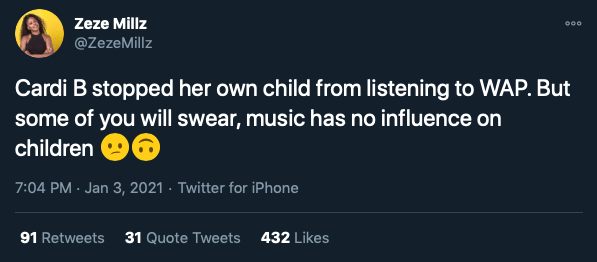The Female Rap Fad : Empowering, or Belittling?
Popular female artist, Megan thee Stallion, debuted her new song ‘Body’ just a matter of weeks ago and already, the crazily catchy tune has made its mark on the social media platform, TikTok. The app has been swarmed with videos of dance challenges and millennials reciting the hook from her song “Body crazy, curvy, wavy, big titties, lil’ waist”. The nature of the lyrics has sparked controversy. To some, these lyrics are derogatory, but not to feminist activist Harriet Street. She says: “I don’t think there’s an issue with a woman celebrating her body. Let’s hear more body types celebrated, let’s hear more confidence.” And this is where the issue lays, with self-confidence: How are lyrics that idolise body appearance affecting the young women that are hearing them and the way in which they perceive their own appearance?
Athina Martin, 21, a sufferer of bulimia and body dysmorphia, is one of the many young women who feel uncomfortable in their body and desire a curvier figure. “When I look in the mirror I see something I feel I’ll never be happy with, I’m always finding something that isn’t good enough,” she says. Athina is not alone. The Dove Self-Esteem Project unveiled that a mere 4% of women worldwide consider themselves “beautiful”. But why?
Social and cultural factors including the music one consumes can heavily influence a young person’s perception of pretty much anything and everything. It’s almost as though in contemporary society if a rapper says something is cool, it is cool. And if it isn’t, it will be cool. A great example of this is when American rapper Future, popularised the watch brand, Patek Philipe, amongst the millennial generation. Suddenly, a sub-culture of people who are more than likely unable to access the product, know all about Patek Phillipe’s. Kash Doll, (also an American rapper) touches on this in her popular song ‘Ice Me Out’: “He gave me neck, now I got Patek, These bitches only want that shit cause they heard Future say it.”
Notorious for discussing disputable topics, popular TV show host Zeze Millz touched on this topic just last night on her Twitter page, which boasts over twenty-thousand followers. She refers to possibly the most explicit song to see the charts, ‘WAP’ by Cardi B and Megan thee Stallion. But if the music is connoting female empowerment, surely this influence isn’t necessarily negative.
Traditionally, the hip-hop and rap genre was heavily dominated by male artists, who typically discuss themes such as money, drugs, sex and boast of pretty perfectly shaped women who fall at their feet. For decades, male rappers including The Notorious B.I.G (Biggie Smalls), Fat Joe and Kanye West have included sexualised and misogynistic lyrics within their music – Biggie’s ‘Big Booty Hoes’ serves as a paragon example. Yet these artists don’t create nearly as much uproar as females do when discussing these topics.
This generation of female rappers and the theme of expressing sexualised lyrics that refer to body shape and assets isn’t news. For years, women on the rap scene have expressed themselves and their sexuality through their music, and have been deemed to devalue themselves as a result. Lil Kim is arguable a pioneer of fiery female rap and seemingly an artist who not only paved the way for contemporary artists such as Cardi B and Nicki Minaj but has also influenced their style of music.
Influenced by the same subculture of musicians, up and coming rapper from North London, Kayonne Raquel, better known as ‘Da Petite Princess’ says: “I wish to uplift ALL women with my music.”
North London, Kayonne Raquel, better known as ‘Da Petite Princess’ says: “I wish to uplift ALL women with my music.”
The eighteen-year-old aspiring rapper told me of artists who she admires, Lauryn Hill, Faith Evans and Lizzo to name a few. “It’s real music for real people,” she said. The plus size female artist Lizzo is widely recognised for her expression of body positivity through her music. She is often heard powerfully singing uplifting lyrics such as “Feeling good as hell” (“Good As Hell”) and “Mirror, mirror on the wall, tell me what you see / It’s that, oh my God, it’s lookin’ heavenly” (“Scuse Me”)
Kayonne played me some unreleased tracks, all of which promoted a strong sense of female independence. However, she did confess to giving in sometimes… “Sex sells” said Kayonne whilst rolling her eyes and she admitted to playing on this and using sexualised lyrics within her music at times. “You have to do what you have to do. I want people to hear my music and that’s what gets the attention.” She said. “But my intentions are pure, I intend to empower women.” Kayonne ended our discussion on a very powerful note. She said: “We as artists need to be careful of the cultures we create and cultivate with our music.”
I asked Athina, who struggles with self-confidence what she thinks and feels after listening to ‘Body’. She said: “ As it’s a woman singing about her own body, rather than a man simply sexualising women due to preference, I think it tells girls to aim to be happier in their own skin and feel good and confident with how they look.”
Evidently, music has the power to culturally influence our society, meaning that the more intentional artists are with their lyrics, the more powerful they will be in contributing to positive outcomes.
Click here to see what others thought about the song.
